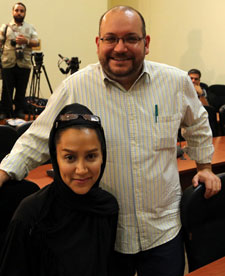I met Jason Rezaian in 2003, at Iran’s Ministry of Culture and Islamic Guidance. We were among the handful of Iranian-American journalists then freelancing in the country, and we were both motivated by the desire to help improve the understanding between Iran and the U.S. Over the years, I have followed Rezaian’s reports. His work in The Washington Post has been informative, insightful, and balanced.
It has now been more than a month since Rezaian and his Iranian wife, journalist Yeganeh Salehi, were arrested in Tehran. Based on what has been reported, and on my own detention in an Iranian prison in 2009, I have an understanding of what they might be experiencing.
The International Campaign for Human Rights in Iran says the couple are being held at a secret detention center. A spokesman for the Iranian judiciary announced last week that the couple are facing “security-based” charges, and media with ties to Iran’s security and intelligence apparatus have started to accuse them of espionage. These statements reveal the kind of allegations the journalists’ interrogators are likely making against them.
I, too, was accused – and convicted – of espionage after a sham trial. Fortunately, I was released after 100 days. But not everyone gets out as quickly. And even one day behind bars in Iran can be terrifying.
Political prisoners in Iran, many of whom are journalists, typically undergo intense interrogations lasting several hours a day, several days in a row. The interrogators are skilled at using threats, isolation, and manipulation to make prisoners feel they have no hope of freedom unless they cooperate and obey. Journalists are often coerced to share information about their colleagues, friends, and sources; to become regime informants; and to “confess” to crimes against the state. Even if they don’t lay a finger on the prisoners, interrogators use this pressure to rob them of their dignity and self-worth.
Sometimes journalists are used to build a case against someone else, or their arrests serve as a warning to other Iranians who support a more open society or the improvement of relations with the West, particularly the U.S.
Many journalists are threatened with long prison terms, even execution, during interrogations. Some have reported being tortured. In 2003, the Iranian-Canadian journalist Zahra Kazemi died in Iranian custody. Her death was followed by the deaths of two Iranian bloggers, Omidreza Mirsayafi in 2009 and Sattar Beheshti in 2012.
Rezaian and Salehi are possibly being held in solitary confinement, without books, a pen, or paper, as I was at first. Every minute in solitary feels like an hour, and every hour feels like a day. Even the strongest souls can lose perspective, courage and faith when they are held alone, cut off from human contact and kindness.
The two journalists are being held in an undisclosed location and have not been allowed access to an attorney, according to their families and employers. This is not unusual for political prisoners in Iran, particularly during the interrogation phase. Even when prisoners are able to use lawyers, these lawyers are often under pressure by hardliners in Iran’s judiciary and security organizations. Many attorneys brave enough to represent political prisoners have ended up in prison themselves.
Iranian authorities often warn the families of political prisoners to remain quiet and avoid speaking to the media. But a public outcry can make a big difference. I was fortunate that officials, groups such as the CPJ, friends, and strangers around the world called for my release in the media and online. This, I believe, helped pressure the Iranian authorities to free me after 100 days. Backers of Rezaian and Salehi have set up a website to spread the word about their imprisonment. I hope they receive the international support and attention they need, and that Iran’s moderates will speak out for them and for other unjustly incarcerated journalists in Iran.
